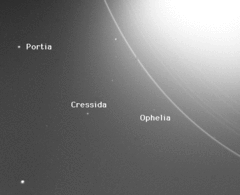天衛九
外觀
 | |
| 發現 | |
|---|---|
| 發現者 | Stephen P. Synnott / 旅行者2號 |
| 發現日期 | 1986年1月9日 |
| 軌道參數 | |
| 二次軌道半徑 | 61,766.730 ± 0.046 km[1] |
| 離心率 | 0.00036 ± 0.00011[1] |
| 軌道週期 | 0.463569601 ± 0.000000013 d[1] |
| 軌道傾角 | 0.006 ± 0.040°(相對天王星赤道)[1] |
| 隸屬天體 | 天王星 |
| 物理特徵 | |
| 大小 | 92 × 74 × 74 km[2] |
| 平均半徑 | 39.8 ± 2 km[2][3][4] |
| 表面積 | ~20,000 km²[a] |
| 體積 | ~260,000 km³[a] |
| 質量 | ~3.4×1017 kg[a] |
| 平均密度 | ~1.3 g/cm³ (假定值)[3] |
| 表面重力 | ~0.013 m/s2[a] |
| ~0.034 km/s[a] | |
| 自轉週期 | 同步[2] |
| 轉軸傾角 | 零[2] |
| 反照率 | |
| 溫度 | ~64 K[a] |
天衛九,又名克萊西達(英語:Cressida、希臘語:Χρησίδα),是環繞天王星運行的一顆衛星,於1986年由旅行者2號發現。[6]
傳統上所有天王星的英語名字都是以威廉·莎士比亞或亞歷山大·蒲柏的作品中的人物的名稱來命名的,這個傳統從約翰·赫歇爾開始的一直延用至今。天衛九的英語名克萊西達是莎士比亞悲劇《脫愛勒斯與克萊西達》中,女主角特洛伊著名悲劇女英雄克萊西達的名字。
參考來源和注釋
[編輯]- 注釋
- 參考來源
- ^ 1.0 1.1 1.2 1.3 Jacobson, R. A. The Orbits of the Inner Uranian Satellites From Hubble Space Telescope and Voyager 2 Observations. The Astronomical Journal. 1998, 115 (3): 1195–1199. Bibcode:1998AJ....115.1195J. doi:10.1086/300263.
- ^ 2.0 2.1 2.2 2.3 Karkoschka, Erich. Voyager's Eleventh Discovery of a Satellite of Uranus and Photometry and the First Size Measurements of Nine Satellites. Icarus. 2001, 151 (1): 69–77. Bibcode:2001Icar..151...69K. doi:10.1006/icar.2001.6597.
- ^ 3.0 3.1 3.2 Planetary Satellite Physical Parameters. JPL (Solar System Dynamics). 2008-10-24 [2008-12-12]. (原始內容存檔於2020-05-21).
- ^ 4.0 4.1 Williams, Dr. David R. Uranian Satellite Fact Sheet. NASA (National Space Science Data Center). 2007-11-23 [2008-12-12]. (原始內容存檔於2010-01-18).
- ^ Karkoschka, Erich. Comprehensive Photometry of the Rings and 16 Satellites of Uranus with the Hubble Space Telescope. Icarus. 2001, 151 (1): 51–68. Bibcode:2001Icar..151...51K. doi:10.1006/icar.2001.6596.
- ^ Smith, B. A. Satellites of Uranus. IAU Circular. 1986-01-16, 4164 [2011-10-29]. (原始內容存檔於2011-11-05).
| 這是一篇與衛星相關的小作品。您可以透過編輯或修訂擴充其內容。 |
